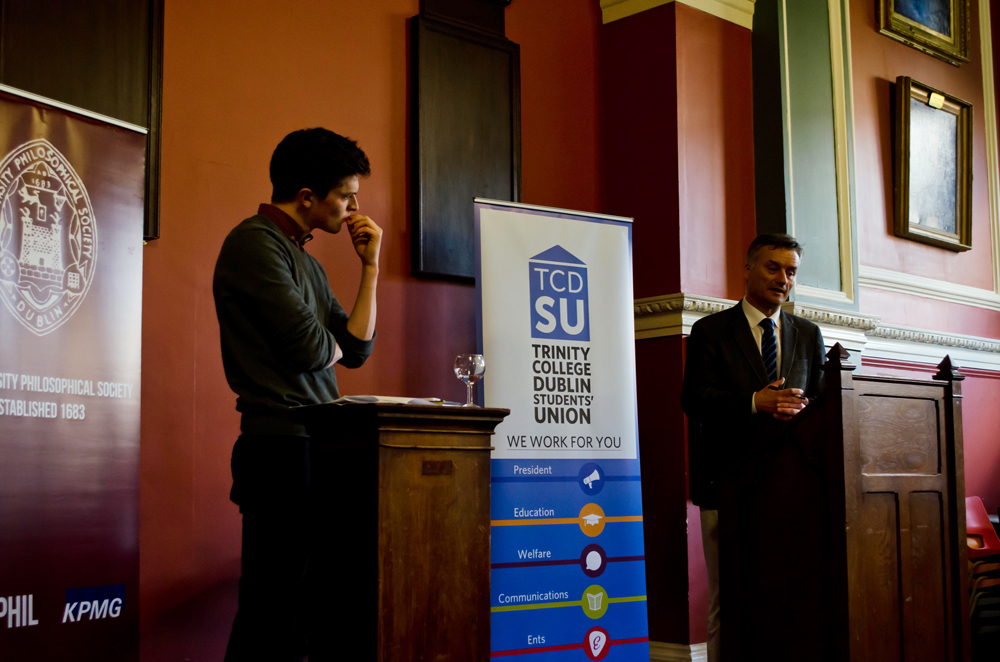Jack Leahy and Edmund Heaphy
Speaking at a Q&A session facilitated by the University Philosophical Society and Trinity College Dublin Students’ Union, Provost Patrick Prendergast has insisted that it is “not [his] purpose in being Provost to ensure Trinity is privatised”. The Provost also confirmed that the College is assessing off-campus properties for renovation for student accommodation purposes.
Prendergast also used the session – his first such occasion since October 2011 – to answer questions from students on accommodation, strategic planning, funding cuts to student organisations, and third-level funding.
TCDSU President, Domhnall McGlacken-Byrne, moderated the session, which was introduced by Phil President, Sarah Mortell, and contextualised by TCDSU Communications Officer, Samuel Riggs, who also serves as editor of The University Times. Riggs’s introduction was pointed, summarising a number of the unfulfilled promises made by the Provost in his 2011 election manifesto.
A crowd of around 100 turned up to hear the Provost engage in the first event of its kind since the early days of his tenure in 2011. If that event, with the same hosts, felt scripted and practiced, the 2014 installment felt more informal in character as the Provost spoke without notes and there was no requirement to submit questions in advance.
McGlacken-Byrne opened by citing accommodation shortages in Dublin City, raising the notion that accommodation was effectively a student service. This prompted an exchange in which the Provost accepted that College had “a degree of responsibility” for providing accommodation and affirmed that “there’s something special about being in rooms.”
Responding to criticisms of the College’s planning with regards to student numbers, Prendergast said that finding the correct site and developers for potential new builds was proving “difficult”, but that he hopes to have overseen the build of 2,000 new rooms within five years. Windmill Lane and Spencer Dock were cited as potential sites.
This is the first occasion on which the Provost has spoken of Dublin’s escalating accommodation crisis. Dean of Students, Kevin O’Kelly, confirmed in September that plans are in place to renovate Oisín House of Pearse Street into a building with 300 student rooms by 2018. As an interim relief measure, Prendergast told TCDSU Welfare Officer Ian Mooney that the College will support the SU in assisting struggling students.
When asked to clarify reports that he was considering turning Trinity into a private university, the Provost claimed to be unaware of the reports but insisted that there were no plans for such a drastic changes.
“We can consider everything from complete privatisation to complete nationalisation. The truth is, Trinity College is somewhere in the middle. It’s a publicly funded organisation, a public university of course, and quite rightly, I’m proud to be a public university, operating in the public good – both privately and publicly funded.
“At the Trinity Global Graduates Forum, we mused over the idea of privatisation as part of a debate topic. But that’s not the way universities are organised in Europe.”
“It’s not my purpose in being Provost to ensure Trinity is privatised.”
The Provost said he was working on a number of options for increasing the College’s non-exchequer funding, “whilst not letting the government off the hook”. He seemed to suggest that he would support an increase in private contribution to tuition:
“I started out from the position of not wanting fees. But I think we have to look at what’s happening: around the world, public funding of higher education is reducing and what individuals are expected to pay up front is increasing. And we would wonder what the Irish government’s policy is going to be with regard to this.”
“The Minister for Education has set up a funding group to look at it and will be reporting by the end of 2015, which in my opinion is far too late. There will be an interim report before the end of the year, so we’ll get some sort of idea then of the direction of the government.”
Asked by McGlacken-Byrne whether or not this represented the government “kicking the can down the road”, and if this would be harmful, Prendergast responded that he was concerned that the delay might lead to the debate on third-level funding “being lost” in discussions before the next General Election.
It had been anticipated that the Provost would come under fire as a result of a 5 per cent cut to student organisations, and the only surprise was that it took until the second hour for the topic to arise. He indicated regret that the decisions had been made “without proper student consultation” but insisted that the “sacrosanct” protection from cuts that these organisations had enjoyed was “unsustainable”.
When asked if he believed that the College was exploiting students through zero-hour contracts and free labour from postgraduate students, the Provost claimed to be unaware of any such activity. He did, however, endorse the controversial JobBridge scheme, expressing that it was his duty ‘as one of the largest employers in Dublin’ to embrace the spirit of ‘offering an opportunity’ to young people.
The Provost was in combative form, frequently interjecting to correct misunderstandings and inaccuracies in questions. He told one journalist from Trinity News that she could use “a lesson in College history” to correct a misunderstanding in relation to funding for a Student Centre allocated in the the last strategic plan. Plans for a Student Centre were voted down by students in February 2011.
In relation to the proposed introduction of levies last May, which were widely protested by students, Prendergast said:
“In our determination to ensure that we’re still providing services, the money has to come from somewhere. That’s the bottom line. Now I do agree that these charges were a bit ham-fistedly done and I wasn’t happy with that myself.”
Sinéad Baker also contributed reporting to this piece.
Photo by Sinéad Baker for The University Times.







